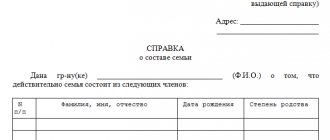Inheritance law involves several instruments that are binding upon the death of the testator and are formalized in the form of written orders. In a traditional will, a person typically states his will regarding his own property . At the same time, it is possible to draw up a testamentary assignment - an order regarding the obligation of the heirs to perform a certain action , both material and intangible. The procedure for the execution of a testamentary assignment is determined by the Civil Code (Civil Code) of the Russian Federation.
Responsibilities to assign
A person who receives an inheritance with an assignment must, within the limits of this amount, fulfill the will of the testator. If there are debts, they are repaid first, the remaining amounts are sent to fulfill the assignment. If the heir receives the obligatory part, then it remains at his disposal.
The legislator based this burden on the concept of “generally beneficial purpose” without providing any criteria. Moreover, the objects indicated in the testamentary assignment vary greatly from person to person. Starting from feeding animals and watering flowers to helping orphanages, shelters and hospitals.
Conditions of testamentary refusal
A testamentary assignment should not limit the freedom of action of the heir, but it is important that in the process of its implementation the will of the testator is respected.
Conditions may require:
- Transfer some items from the inherited property (things, furniture, etc.);
- Provide property for personal use;
- Perform a number of works or provide services;
- Pay a one-time amount;
- Carry out the instructions of the testator.
How and where is a will and assignment made?
According to Russian law, any will must be drawn up in writing with mandatory notarization. If there is a testamentary assignment, the testator's disposition is only burdened with certain requirements for the heir. The law does not contain any special rules for including onerous provisions in the text of a will. They must be clearly expressed and written down to avoid future controversial issues.
Complex testamentary assignments, for example, opening a museum in the testator’s apartment or organizing payments to charitable institutions, require control over their execution.
In these cases, notaries recommend appointing executors.
Reimbursement of expenses related to the execution of a will
Article 1136 of the Civil Code establishes the right of the executor to demand compensation for expenses incurred by him related to the execution of the will of the testator. In addition, the will may provide for the payment of remuneration. This item is included in the document according to the will of the property owner.
Expenses are reimbursed in accordance with the will, since civil law weakly regulates this area of relations. It is being clarified whether a provision on remuneration was included in the text of the will; if so, then its size and payment terms need to be clarified.
The executor does not have the right to demand that the heirs pay him remuneration if this was not specified in the will. If the executor is not satisfied with the written provisions regarding payment, then he may not give his consent to the execution of the will.
Executor of inheritance assignment
The executor can only be an individual, either one of the heirs or any other person chosen by the testator.
A will refers to unilateral transactions where the will of one party is sufficient. The appointment of an executor to carry out certain tasks is, in fact, a bilateral agreement, and its conclusion requires the consent of both parties.
The citizen appointed as executor must express his consent as follows:
- signatures on the document together with the testator in the presence of a notary;
- at a notary office within one month after the death of the testator;
- actually taking up the duties of a performer.
Who can be the performer?
A testamentary assignment is a unilaterally binding transaction. A person who has accepted an inheritance has certain obligations that require immediate fulfillment.
The testator has the right to independently determine the executor. Any person with full legal capacity can become an executor. In return, the heir receives the property after the death of the testator.
The property of the deceased, which goes to the heir, is used to ensure that the executor fulfills his obligation. You can learn more about this from paragraph number one of Article 1139 of the Civil Code of the Russian Federation.
Often, potential executors are not even aware of their appointment. Article 1134 of the Civil Code of the Russian Federation does not say anything about the fact that before choosing an executor and indicating him in the will, it is necessary to find out about his consent.
Consent is issued within thirty days after the death of the testator by:
- signature of the executor on the document;
- filing a statement attached to the will;
- drafting a document that is submitted to a notary.
The beginning of the execution of the assignment means that the candidate has expressed his consent to fulfill the last will of the deceased. The executor and heirs have the right to go to court to be released from the assigned duties.
Dear readers! To solve your problem right now, get a free consultation
— contact the on-duty lawyer in the online chat on the right or call:
+7
— Moscow and region.
+7
— St. Petersburg and region.
8
- Other regions of the Russian Federation
You will not need to waste your time and nerves
- an experienced lawyer will take care of solving all your problems!
Responsibilities and rights
The executor controls the implementation of the will of the deceased by the heirs. He exercises his powers in accordance with the assignment and applies on the basis of this document to various authorities, if necessary. All expenses associated with the implementation of the order are paid by the heirs from the estate, including the activities of the executor.
If the heirs do not fulfill their wishes, the executor has the right to go to court on his own behalf.
The obligations of the performer are terminated only in court:
- according to his personal statement;
- at the request of the heirs.
The reason may be impossibility of execution.
What may be specified in a will
In Art. 1139 of the Civil Code of the Russian Federation regulates an indicative list of actions that may be assigned under a will:
- all actions related to the burial of the deceased testator (as a rule, the testator indicates from which sources the expenses will be paid, or will leave these issues to the permission of the heir);
- maintenance, supervision and care of the deceased’s pets for the entire period of their life;
- actions for generally beneficial purposes, or in other directions that do not contradict the law.
Since the will of the testator, expressed in the text of the will, is protected secret until the moment of his death, the heirs learn about the assigned responsibilities only after the opening of the inheritance case. The right to demand the performance of actions arises from any interested parties, and it can be presented in court.
Features of the execution of the assignment
The most important distinguishing feature of a testamentary encumbrance that has a financial component is the absence of a specific beneficiary and a wide range of people who have the opportunity to demand fulfillment of the conditions of the encumbrance. This is due to the fact that it is public in nature and has a social orientation. This is very atypical for agreements that provide for various types of material rewards.
In addition, the obligation to perform passes by inheritance, which is clearly stated in Article 1140 of the Civil Code. This happens when:
- the primary heir did not want to inherit;
- died before or after receiving the right of inheritance.
If the heir does not want to fulfill any requirements imposed on him, he refuses the inheritance. It's his right. The refusal is formalized by a notary.
In a burdened inheritance, obligations and money are a single mass. It is impossible, when entering into an inheritance with an encumbrance, to refuse the encumbrance by accepting the inheritance without it.
Refusal rules
These rules apply to:
- Ensuring complete freedom in drawing up a will;
- Freedom of rights of the legatee;
- Prohibition of drawing up a waiver document in favor of other persons;
- The refusal document cannot contain conditions or excuses.
The presence of conditions and excuses invalidates the legal force of the document, but only in relation to the part that contains excuses and conditions.
If the legatee is an heir
If the legatee and heir are one person, then he also has the right to refuse the obligations assigned to him by this document. He also refuses that part of the inheritance to which they relate. But if he is the heir of an obligatory share, then even by renouncing it, he does not necessarily renounce the responsibilities that were assigned by the testator. To do this, he must separately formalize the refusal of the testamentary assignment.
Example and sample
A testamentary assignment, for example, with property contains information:
- apartment with an area of___sq.m., located at ____________ (reg. N__);
- country house with an area of ______ sq.m., located____________ (reg. N__);
- land plot with an area of _________, located (cadastral N___).
Or in the formulation “everything that belongs to me on the date of death” an indication is added, which forms the assignment:
- I entrust to the heir under this will - __________________, the responsibility for caring for the garden___________, located___________for 5 years after my death, as well as for my dog until her death, at the expense of the property I left behind.
- I appoint _______________________________________ as the executor
- Explanations of articles_________________________________________________
- Technical issues regarding document storage ___________________
- Presence of a witness _________________________________________________
_________________________________________________________________
Notary marks with date, registration numbers, seal. There are no rigid models, since the form of presentation is free.
The essence of the document
The essence of a will with a testamentary assignment is that the heir becomes a debtor until the assigned duties are fulfilled. Without this, he cannot obtain ownership of the inheritance.
It is important to understand that a testamentary refusal and a testamentary assignment, when compared, turn out to be practically the same thing. Only refusal is the very will of the testator, and recovery is the duties assigned to the heir by this will. But in practice, one cannot exist without the other, and this is formalized within the framework of one document.
Subject of testamentary assignment
The law does not specify the areas for testamentary assignment, since it is not mandatory. The paper is drawn up by a notary. If the testator plans to impose obligations on his heirs to perform illegal actions, then the document will not be certified. Without this, it has no legal force.
If the testator's wishes do not contradict the law, then it is included in the text and signed. As a rule, this concerns the charitable sphere, various federations, culture, education and science. A lot of information about this can be found on Wikipedia.
In practice this occurs very rarely. All wishes of this kind of non-property nature are usually voiced to relatives orally and are not included in testamentary papers. The transfer of valuable items to charitable, scientific and religious institutions is carried out during one’s lifetime.
Form of testamentary refusal
The form of testamentary assignment and testamentary refusal varies, but is strictly defined by law.
As a separate clause, the refusal may be included in:
- Ordinary open will;
- Closed will;
- In the will indicating the officials;
- A will drawn up by authorized employees of a military unit, hospital, or colony.
Its execution by the legal successor in respect of whom it was drawn up depends on the correctness of the execution of the testamentary assignment.
This document must be certified by a notary, otherwise the obligations specified in it will not have legal force.
The difference between a testamentary assignment and a testamentary refusal
From a legal point of view, the differences between them are minor. Especially when the assignment is of a property nature.
The most significant distinctive features of a testamentary refusal are:
- a clear indication of whose benefit it was made;
- execution only by the testator;
- the right to obtain a refusal is legal for three years;
- cannot be passed on to other people under any circumstances.
It can be noted that in practice it occurs much more often, while the assignment is more academic than applied in nature.
Testamentary refusal
This document and the requirements for it are defined in Article 1137 of the Civil Code of the Russian Federation. It defines the duties that the heirs must fulfill using funds from the inherited property.
The specific implementation of such responsibilities may vary significantly. This could be a requirement to repay a loan or give part of the inherited money to a relative. The amount of such payments cannot exceed the entire inherited amount.
Examples of execution of a will
Examples of testamentary refusal and testamentary assignment are varied. As a rule, they relate to the transfer of property to an heir with additional conditions. For example, a house has been bequeathed. But at the same time, the testator indicated a condition - to grant the right to live in it to his niece until she reaches the age of 25. Thus, upon reaching this age, the obligations cease to apply. But until this moment, the heir is obliged to provide her with such right of residence. The niece in this case is the legatee.







